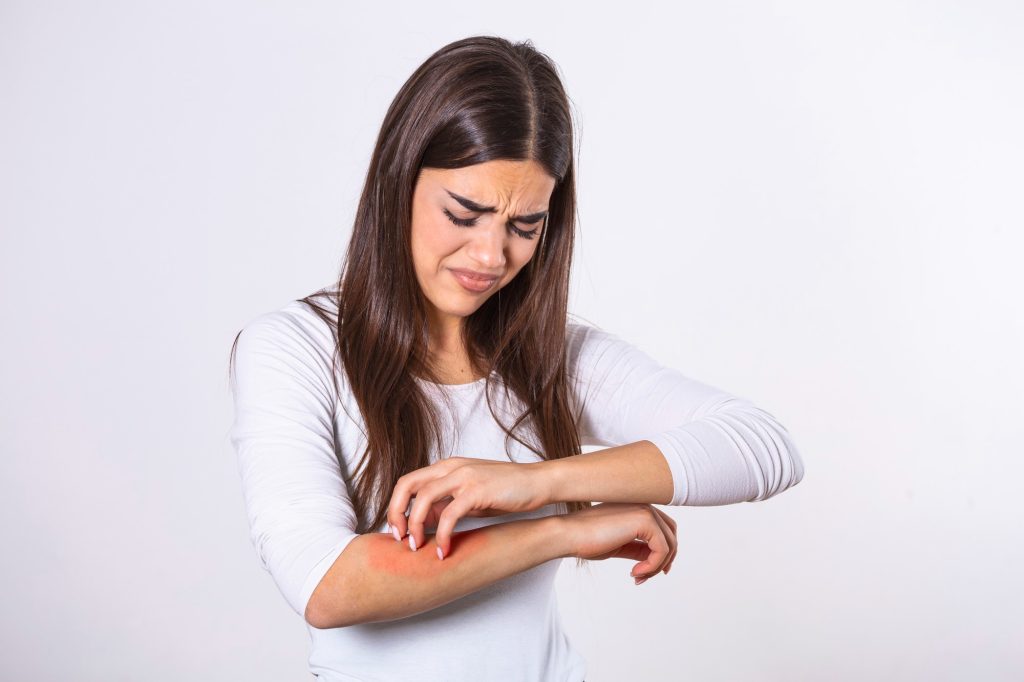
Psoriasis is a chronic (long-lasting) noncommunicable disease caused by an overactive immune system that leads to excessive skin cell proliferation. It causes inflamed, red, raised areas of skin (plaques). The plaques itch and can be painful. This condition can often be seen on the scalp, elbows, knees, and lower back. It can occur at any age, with 50 to 69 being the most prevalent [1].
While the exact cause of psoriasis is not fully understood, factors such as genetics, immune system dysfunction, and environmental triggers can contribute to flare-ups.
Dry skin and cold weather deplete the skin’s natural moisture content, exacerbating psoriasis flare-ups in the winter. People also frequently take hot baths, which further dries out their skin and aggravates itching. Both dry skin and less sun exposure might cause a flare-up of psoriasis [2].
Some common symptoms of psoriasis
Psoriasis symptoms differ from person to person however, some typical ones are as follows:
-Tiny or big, elevated, inflammatory skin lesions that show up as brown or purple on darker skin tones and pink or red on lighter skin
-Presence of flaky skin with whitish-silver or gray scales
-Dry, cracked skin that itches or bleeds
-Burning, itching, or soreness near the patches
-Presence of pus-filled boils (pustular psoriasis)
-The patches are typically found over major joints and can be symmetrical (guttate psoriasis)
-Stiff, swollen or painful joints (psoriatic arthritis) [3].
The symptoms of psoriasis can come and go. You may experience flare-ups or periods when your symptoms worsen, interspersed with periods when you feel better.
If you notice any of these symptoms of psoriasis, it is important to see your doctor soon because untreated psoriasis can lead to irreversible damage.
Consult A Doctor
Ways To Deal With Psoriasis Flares In Winter Season
1. Stay Hydrated
It is a golden saying: “Always stay hydrated even if you do not feel thirsty.” In the winter, staying hydrated helps maintain moisturized skin. As a result, there is less inflammation and a potential reduction in psoriasis flare-ups characterized by cracking and dryness.
Tip: To prevent winter flare-ups, fill your water bottles and remember to drink water throughout the day.
2. Increase Daily Moisturization
During the winter, moisturize your skin more often using heavier creams, lotions, and moisturizing oils to prevent dehydration. Because thick, scaly skin is a hallmark of psoriasis, it’s important to moisturize and lock in moisture regularly to help soothe sensitive skin.
Tip: Go for topical creams containing active chemicals like salicylic acid, corticosteroids, coal tar, or prescription retinoids if over-the-counter creams and lotions aren’t helping your psoriasis.
Order medicines online.
Click Here
3. Let Your Skin Breathe
To stay warmer in the winter months, you may want to wrap up in heavy, thick wool and wear layers of clothes, but these heavy materials can irritate the skin, make us itch more, and worsen psoriasis areas.
Tip: Choose loose, lightweight layers and mild cotton instead to better control the pain and discomfort.
4. Avoid Long Showers
You must modify your everyday skincare routine to combat dry, cracked skin as winter approaches. This entails avoiding long, hot showers since they might dehydrate your skin and remove the natural oils that protect it.
Tip: Instead, choose restorative oatmeal and Epsom salt baths that soothe symptoms, lessen inflammation, and moisturize the skin, as well as shorter, lukewarm showers.
5. Use Humidifiers To Retain Moisture
Dry, cold air can cause skin irritation and itching, worsening underlying skin diseases like psoriasis. Employing humidifiers in a room can help maintain optimal humidity levels, supporting skin hydration and overall well-being during the colder months.
Invest in a good humidifier to prevent psoriasis flare-ups and ensure a comfortable and well-hydrated indoor environment.
Discover Here
6. Improve Your Diet
Eating a nutritious, healthful, and nutrient-dense diet in the winter is an often overlooked but incredibly important step for managing psoriasis. The diet can impact the severity of psoriasis, just like it can have on other aspects of health and well-being.
Tip: Add colorful veggies and fruits such as spinach, carrots, and bell peppers to reduce inflammation. Avoid red meat, processed foods, fatty foods, milk products, and foods that aggravate itching and inflammation.
Address the potential triggers and follow these simple lifestyle steps to help alleviate or manage psoriasis flare-ups in winter.
“Take Control, and Tackle Psoriasis”
(The article is written by Simran Suri, Assistant Team Lead, and reviewed by Dr.Subita Alagh, Senior Executive)